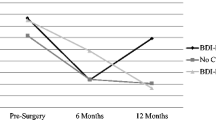Background
Prior studies have documented elevated symptoms of depression among patients undergoing gastric bypass surgery, in addition to significant elevations of inflammatory markers including C-reactive protein (CRP) and interleukin-6 (IL-6). No prior study has examined the relationship of changes in depression with change in inflammation among patients undergoing gastric bypass surgery. This pilot study was designed to examine the relationship of inflammation and depression among gastric bypass patients in a 12-month longitudinal study.
Methods
13 Caucasian women (mean age 46.9 ± 5.7 years) who were scheduled to undergo a Roux-en-Y gastric bypass (RYGBP) were recruited prior to surgery for measurement of body mass and blood markers of inflammation, as well as self-report measures of depression, quality of life, and disordered eating. 12 months later, subjects completed the same battery of physiological and psychological measures. Data were analyzed with paired t-tests and Pearson correlations.
Results
In addition to significant reductions in BMI (P < .001), participants experienced significant reductions in CRP (P < .001), IL-6 (P = .002), and depressive symptoms (P = .025). Reductions also were observed in binge eating (P = .005). Decreased depression during the 12-month follow-up was highly correlated with reduced CRP (r = .98, P < .001).
Conclusions
Results from this pilot study indicate that RYGBP is associated with significant reductions in inflammatory markers of cardiovascular disease risk (e.g., CRP, IL-6) and depressive symptoms, in addition to reductions in weight. Results suggested that reductions in depression were associated with the observed decreases in inflammation.
Similar content being viewed by others
References
Pories WJ, Swanson MS, MacDonald KG et al. Who would have thought it? An operation proves to be the most effective therapy for adult-onset diabetes mellitus. Ann Surg 1995; 222: 339–52.
Sjöström L, Lindroos A, Peltonen M et al. Lifestyle, diabetes and cardiovascular risk factors 10 years after bariatric surgery. N Engl J Med 2004; 351: 2683–93.
Kral JG, Brolin RE, Buchwald H et al. Research considerations in obesity surgery. Obes Res 2002; 10: 63–4.
Rabner JG, Greenstein RJ. Obesity surgery: expectations and reality. Int J Obes 1991; 15: 841–5.
Alsabrook GD, Goodman HR, Alexander JW. Gastric bypass for morbidly obese patients with established cardiac disease. Obes Surg 2006; 16: 1272–7.
Dymek MP, leGrange D, Neven K et al. Quality of life and psychosocial adjustment in patients after Rouxen-Y gastric bypass: A brief report. Obes Surg 2001; 11: 32–9.
Sarwer DB, Wadden TA, Fabricatore AN. Psychosocial and behavioral aspects of bariatric surgery. Obes Res 2005; 13: 639–48.
Sanchez-Santos R, Del Barrio MJ, Gonzalez C et al. Long-term health-related quality of life following gastric bypass: Influence of depression. Obes Surg 2006; 16: 580–5.
Connor TJ, Leonard BE. Depression, stress and immunological activation: The role of cytokines in depressive disorders. Life Sci 1998; 62: 583–606.
Miller GE, Freedland KE, Carney RM et al. Pathways linking depression, adiposity, and inflammation in healthy young adults. Brain Behav Immun 2003; 17: 276–85.
Ladwig K-H, Marten-Mittag B, Hannelore L et al. Influence of depressive mood on the association of CRP and obesity in 3205 middle aged healthy men. Brain Behav Immun 2003; 17: 268–75.
Das UN. Is obesity an inflammatory condition? Nutrition 2001; 17: 953–66.
Pai JK, Pischon T, Ma J et al. Inflammatory markers and the risk of coronary heart disease in men and women. N Engl J Med 2004; 351: 2599–610.
Zagorski SM, Papa NN, Chung MH. The effect of weight loss after gastric bypass on C-reactive protein levels. Surg Obes Rel Dis 2005; 1: 81–5.
Cottam DR, Schaefer PA, Shaftan GW et al. Effect of surgically-induced weight loss on leukocyte indicators of chronic inflammation in morbid obesity. Obes Surg 2002; 12: 335–42.
Beck AT, Ward CH, Mendelson M et al. An inventory for measuring depression. Arch Gen Psychiat 1961; 4: 561–71.
Ware J, Snow K, Kosinski M et al. SF-36 Health Survey: Manual and Interpretation Guide. Boston: Health Institute, New England Medical Center 1993.
Gormally J, Black S, Daston S et al. The assessment of binge eating severity among obese persons. Addict Behav 1982; 7: 47–55.
Fairburn CG, Beglin SJ. Assessment of eating disorders. Interview or self-report questionnaire? Int J Eat Disord 1994; 16: 363–70.
Author information
Authors and Affiliations
Corresponding author
Rights and permissions
About this article
Cite this article
Emery, C.F., Fondow, M.D.M., Schneider, C.M. et al. Gastric Bypass Surgery is Associated with Reduced Inflammation and Less Depression: a Preliminary Investigation. OBES SURG 17, 759–763 (2007). https://doi.org/10.1007/s11695-007-9140-0
Received:
Accepted:
Published:
Issue Date:
DOI: https://doi.org/10.1007/s11695-007-9140-0




